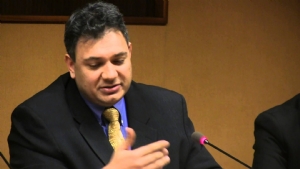Gilgit Baltistan and Rising Extremisim: An Interview with Senge Sering

Senge H. Sering is the President of the Institute for Gilgit Baltistan Studies, based in Washington DC. The institute aims to promote the rights of the inhabitants of Gilgit Baltistan, which is a UN declared disputed area under Pakistan’s control since 1947. Given their religious and ethnic backgrounds, the inhabitants of Gilgit-Baltistan are considered a minority in Pakistan.
GHRD spoke to Senge H. Sering about minority rights, sectarian violence, religious extremism and militancy in Pakistan.
Q: What do you think is the most burning issue in Pakistan?
A: I work in a particular region in the North of Pakistan called Gilgit Baltistan; that region is a UN declared disputed area and claimed by both India and Pakistan. We consider that local people do not have access to Pakistan’s constitution represented by the political system, judiciary and socio-economic institutions. Therefore, local people demand autonomy, a genuine autonomy, in Gilgit Baltistan because they cannot really participate in the Pakistani system. That’s the most pressing issue. Lack of political, cultural, economic, and religious rights and absence of control over their land have led to social disorder. When I say social disorder I mean: religious, cultural, linguistic persecution and discrimination against local people.
Q: Which minorities suffer from these persecutions?
A: We have ethnic minorities as well as religious minorities. All the people living in that area speak languages which have no connection to other Pakistani languages. We speak Tibetan, Tajik, Burushaski and Dardic languages. Local people have ethnic relations in Central Asia, Kashmir and Tibet. In the Pakistani political framework these languages are not recognized so the persecution exists and the local languages are now disappearing, they are on the verge of extinction because there is no protection for the local languages.
On the religious minorities’ side, we have the Shias, Nurbakhshi Sufis, Ismailis. These minorities cannot learn about their own religion in the schools. Now the Pakistani government is making some effort to change its school syllabus which has been based on extremist ideology; in the past people who did not believe in jihad for instance, they were forced to be taught about that. Between 2004 and 2005, locals were protesting on the streets for religious rights and clashed with law enforcement personnel. In Gilgit city, the children who wanted to learn about their own religion were arrested.
Q: Do you think that religious extremism is on the rise in Pakistan?
A: So far in Pakistan more than 10,000 Shias have been killed. In Parachinar valley more than 4000 Shias were killed. People are pulled down from the buses, their identity cards are checked, their names are usually different than the Sunni names [so they are easily identified] and they get killed; women have been threaten and molested because of their Shia background. The reason why these things are happening I believe is not a sectarian issue. If you look at the last 60 years, the Christians, Hindus Ahmadis and Shias, they have never attacked the Sunnis. It is just one way traffic, these groups always get attacked and they are always on the run to save their lives when they get attacked by the militants. So it is not a sectarian issue, it is targeted killing; it is a type of killing that is supported by the Pakistani military and intelligence agencies. Whenever somebody attacks Shias and kills them, the attackers take protection in the military cantonments and they never get prosecuted in the courts, 96% of these people who have been blamed for the attacks on minorities, they have never been prosecuted. Less than 4% have been prosecuted so far. Secondly I believe that, it is not the general Sunni population that is attacking the minorities. It is a very clear situation that the militants are involved in the target killings.
Shias live in very strategically located areas in Pakistan where any state apparatus whether its military, paramilitary or secret services want maximum control. They want to promote and advance an agenda and the local Shias are not cooperating with that. So the only way the Pakistani state can secure those areas is by oppressing the local people, making them weak and fearful so when the state wants to use those lands, then there won’t be any opposition or resistance from the local people. So that is why the militants are used to create fear among the Shias by this ongoing killing. So they will never rebel or oppose against the Pakistani policy of using their land and resources for military advancement in India and Afghanistan.
Q: Could we say that usage of militants to secure certain strategic areas fuels religious extremism?
“The militants feel that they are useful, it is all about demand and supply, if the militants know there is a demand for them, they can also put down their own terms and conditions to the Pakistani state”
A: So what the militants want in return is they have an expansionist attitude and want to control land and resources owned by minorities in certain strategic areas; and they do it by oppressing the minorities and ethnically cleansing the areas and forcing the minorities to relocate. Already there are tens of thousands of internally displaced persons (IDPs) in different parts of Pakistan who have been forced to vacate their ancestral homes based on their religious affiliation. The militants follow a very extremist ideology and in that ideology there is no tolerance for people who believe in a different variety of Islam. In next 2-5 years the partnership between the military and the militants will become stronger, as militants will be used for strategic purposes after withdrawal of NATO from Afghanistan; and this will enable them to accumulate more weapons and money and inevitably provide leverage for the militants which will be used against the minorities, and the number of killings and persecution against minorities will rise.

